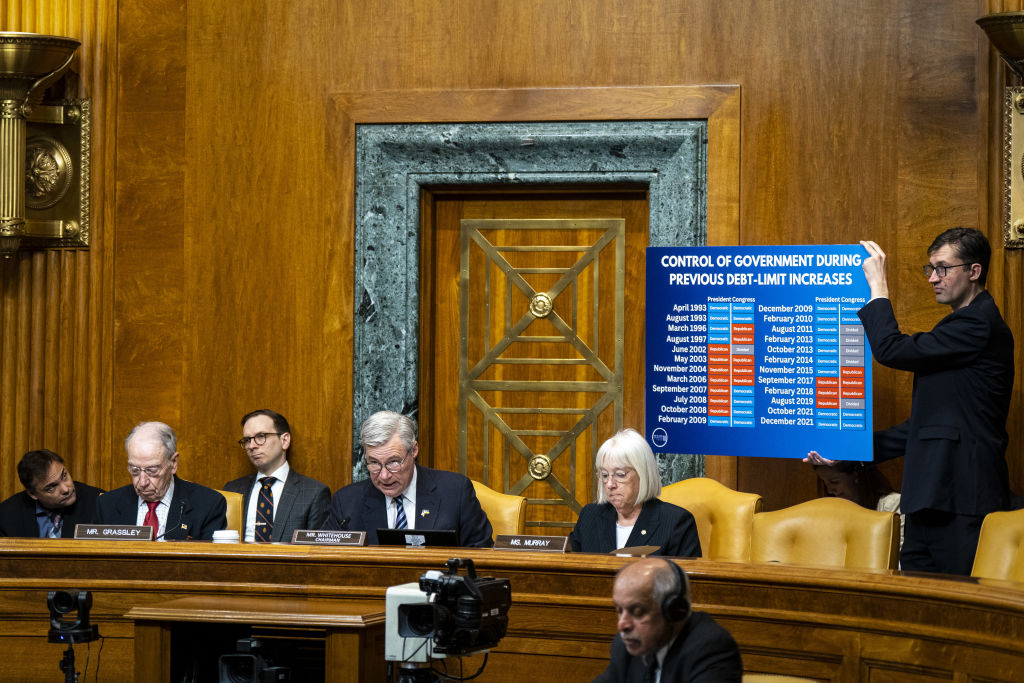
Negotiations over the debt limit appear to be in limbo ahead of next week’s meeting between the four top congressional leaders and President Joe Biden. But the brief pause in action isn’t stopping some lawmakers from ramping up attacks on a GOP bill that would raise the debt ceiling in exchange for spending cuts.
At a Senate Budget Committee hearing on Thursday morning, members clashed over why an agreement to avert a default hasn’t been reached and claimed party leaders are using the debt limit crisis as leverage, offering a glimpse into the kind of political maneuvering that will likely play out in the coming weeks.
This is far from the first time the debt limit and the country’s threat of default has been wielded to score political points. “I think it is fair to conclude that neither party’s hands are clean on debt limit hikes,” said Brian Riedl, a senior fellow at the conservative Manhattan Institute, and one of the panel’s witnesses.
Thursday’s hearing marked the first in a series of meetings that Senate Democrats are holding this month to highlight the economic implications of House Speaker Kevin McCarthy’s debt limit bill, which they have derisively dubbed the “Default on America Act.” Senate Democrats have held firm in their refusal to consider that legislation, stemming from their concern over the various policy concessions Republicans are hoping to extract from Democrats, including a reversal of Biden’s clean energy tax credits and student loan cancellation plan, which the two sides traded jabs over for hours on Thursday.
Sen. Chuck Grassley of Iowa, the top Republican on the budget panel, accused the Democrats’ spending policies of contributing to high inflation, and recited past comments from Democratic leaders to bolster his party’s argument, including a 1984 comment from then-Senator Joe Biden before he voted against raising the debt limit: “I cannot agree to vote for a full increase in the debt limit without any assistance or assurance that steps will be taken earlier next year to reduce the alarming increase in deficits and the debt,” Biden said at the time. Now, Democrats are insisting on passing a “clean” debt ceiling increase without fiscal reforms or cuts attached, haggling over any spending concessions that Republicans want to include as part of the budget process.
The debt limit standoff between Republicans and the White House is coming at an inopportune time, according to Mark Zandi, chief economist of Moody’s Analytics and one of the witnesses, who told lawmakers that there is a possibility that the Treasury Department will run out of cash to pay the government’s bills in as early as four weeks. “By my best calculation, June 8 will be the day when Treasury can’t pay its bills,” he said, adding the “best case scenario will be August 8.” Earlier this week, Treasury Secretary Janet Yellen said the U.S. could default as soon as June 1.
At the hearing, Senate Democrats discussed the McCarthy bill’s “giveaways” to the fossil fuel industry that would stem from rolling back clean energy incentives, and decried the GOP’s plan to rescind extra funding for the Internal Revenue Service (IRS) to go after wealthy individuals and corporations who evade their taxes. The GOP legislation would cut federal spending by nearly 14% over a decade by undoing several major elements of Biden’s domestic agenda, including his clean energy tax credits and student loan cancellation plan. It would also impose stricter work requirements for federal nutrition and health programs starting next year. Zandi estimated that the debt limit bill would cost the economy 800,000 jobs and increase unemployment by half a percentage point.
But at least until May 9, when President Biden has invited McCarthy, Senate Majority Leader Chuck Schumer, Senate Minority Leader Mitch McConnell, and House Minority Leader Hakeem Jeffries to the White House to discuss the matter, the political theater is likely to continue without any substantive progress. “I think May 9 is an important deadline,” Sen. Sheldon Whitehouse, a Democrat from Rhode Island and chairman of the Senate Budget Committee, tells TIME. “It would be nice if responsible heads prevailed in the House and said now that we have a meeting with the President we’re going to talk about [lifting] the threat of default off the United States economy. But I think given the extremism at work in their party right now, it’s not a likely scenario.”
Other lawmakers say they will know more about the path forward after that meeting, but doubt they will reach a deal anytime soon. “The President’s going to be putting together a meeting, hopefully we’ll get a better sense of where McCarthy is and where the House Republicans are,” Sen. Gary Peters, Democrat of Michigan, tells TIME. “We’ve got to find a way to come together.”
In the meantime, both parties are attacking the other as being hypocritical or playing a dangerous game with the country’s cash. “This committee ought to be embarrassed,” Sen. Mitt Romney, Republican of Utah, said at the hearing. “The American people expect us to work on a bipartisan basis to address the challenges that America faces… rather than holding hearings that are about preening and posturing and politicizing and trying to blame the other party. It’s really embarrassing.”
Even on that, they couldn’t agree: “I don’t think the record of the hearing supports that kind of rhetoric at all,” Whitehouse says of Romney’s comments.
More Must-Reads from TIME
- Cybersecurity Experts Are Sounding the Alarm on DOGE
- Meet the 2025 Women of the Year
- The Harsh Truth About Disability Inclusion
- Why Do More Young Adults Have Cancer?
- Colman Domingo Leads With Radical Love
- How to Get Better at Doing Things Alone
- Michelle Zauner Stares Down the Darkness
Write to Nik Popli at nik.popli@time.com